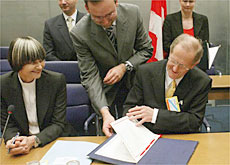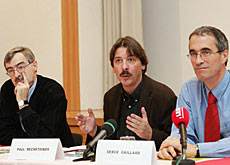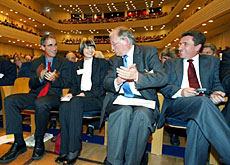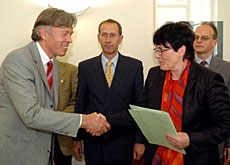Swiss and EU hail signing of bilateral accords

Switzerland and the European Union have signed a second set of bilateral agreements, as well as a protocol on extending an accord on the free movement of people to the new EU member states.
It remains to be seen whether the accords signed on Tuesday in Luxembourg will be the last between the two sides.
Both sides described the occasion as an “important day” for Swiss-EU relations.
“With these treaties we will enrich and expand our close cooperation,” said the representative from the European Commission, Jonathan Faull.
Switzerland was represented at the low-key ceremony by Swiss President Joseph Deiss and Foreign Minister Micheline Calmy-Rey.
Speaking after the package of nine accords had been signed, Calmy-Rey made it clear there was still a long way to go before the treaties could come into force.
“For me, the best day will be when we have concluded the whole political process and when the treaties have been ratified,” she said.
The signing of the accords paves the way for the ratification process to begin. The Swiss parliament is expected to discuss the treaties in December.
But Swiss voters are likely to have the final word on whether the accords are accepted.
The rightwing Swiss People’s Party and the isolationist Campaign for an Independent and Neutral Switzerland have already threatened to force a nationwide vote on one of the most controversial of the nine accords: the Schengen/Dublin treaty which governs closer cooperation on security and asylum.
Bilateral way
Switzerland has not ruled out the possibility of new negotiations on further bilateral agreements.
Interior Minister Pascal Couchepin recently quipped that “neighbours should never stop negotiating”.
René Schwok, professor of political science at Geneva University, shares this view.
“These agreements strengthen the bilateral way, because they allow the Swiss government to adjourn the membership question – without being marginalised,” Schwok told swissinfo.
He added that membership talks would lead to great opposition from the strong bankers’ lobby.
“They oppose any kind of membership talks because they fear that this would raise questions about banking secrecy, which has been retained thanks to the agreement on the taxation of savings income,” said Schwok.
Jean Russotto, president of the Swiss-European Union committee of the Swiss Chamber of Commerce in Belgium, believes that Switzerland will most likely stick to the bilateral path.
“These bilateral agreements will be further developed; they will be changed and improved,” said Russotto.
“We can forget moving towards EU membership, even if that remains the government’s declared goal,” he added.
Small steps
The second set of bilateral agreements consists of three main accords – taxation of savings income, combating customs fraud and Schengen/Dublin – and six accords allowing Switzerland to participate in various European programmes in the fields of agriculture, statistics, pension schemes, the environment and the EU’s media programme.
Switzerland is considering the possibility of renewing negotiations with the EU once the second series of bilateral agreements has been ratified.
Negotiating in small steps allows the Swiss government to conduct negotiations on different issues at the same time, which would not be possible if Switzerland was an EU member.
Russotto said that it was important to know Brussels’ view on the Swiss approach, because the European Commission had always made it clear that it preferred membership negotiations to bilateral agreement talks.
“It is not very likely that the EU will change its strategy. On the contrary, there could be great opposition to Switzerland’s wish for special treatment and solutions.”
A senior EU official is sceptical that new negotiations will take place, commenting that there are no outstanding issues the European body wants to address.
In the next few months, bilateral agreements with Switzerland are not expected to be high on the EU’s priority list, as the union has more urgent problems on its plate.
swissinfo, Barbara Speziali
The agreement on the taxation of savings income requires Switzerland to impose a withholding tax on EU residents’ savings.
The accord on combating fraud allows Switzerland and the EU to jointly fight smuggling.
The Schengen and Dublin accords will allow Switzerland to do away with border controls.
The signing of the second round of bilaterals marks the start of the ratification process.
The Swiss parliament is expected to discuss the accords in December.
Swiss voters are likely to have the final say at the ballot box sometime next year.
On the EU’s side, the accord on combating fraud has to be ratified by the 25 member states.

In compliance with the JTI standards
More: SWI swissinfo.ch certified by the Journalism Trust Initiative



You can find an overview of ongoing debates with our journalists here. Please join us!
If you want to start a conversation about a topic raised in this article or want to report factual errors, email us at english@swissinfo.ch.